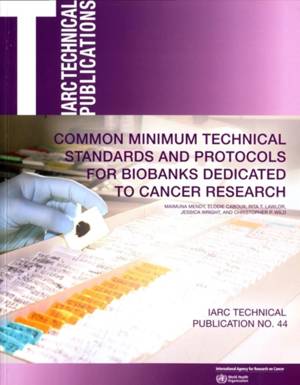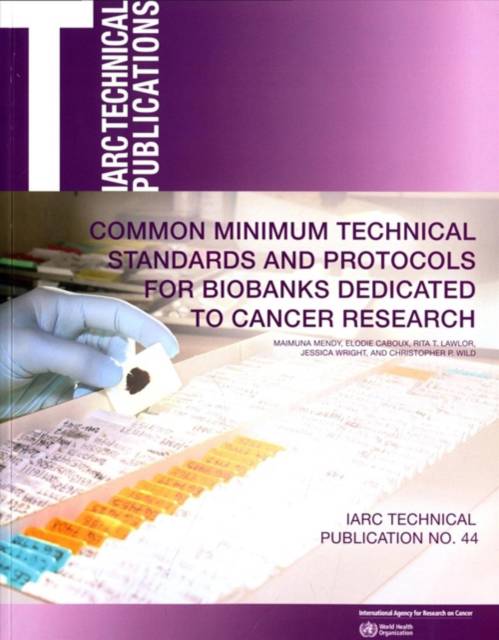
Je cadeautjes zeker op tijd in huis hebben voor de feestdagen? Kom langs in onze winkels en vind het perfecte geschenk!
- Afhalen na 1 uur in een winkel met voorraad
- Gratis thuislevering in België vanaf € 30
- Ruim aanbod met 7 miljoen producten
Je cadeautjes zeker op tijd in huis hebben voor de feestdagen? Kom langs in onze winkels en vind het perfecte geschenk!
- Afhalen na 1 uur in een winkel met voorraad
- Gratis thuislevering in België vanaf € 30
- Ruim aanbod met 7 miljoen producten
Zoeken
Common Minimum Technical Standards and Protocols for Biobanks Dedicated to Cancer Research
International Agency for Research on Cancer
€ 27,95
+ 55 punten
Omschrijving
Biobanking has developed at a rapid pace in recent years, initiated by the drive for personalized medicine and the need for high-quality biological resources, associated data for scientific research, and technological advancement of analytical platforms for molecular and genetic research.
This book includes guidelines and recommendations for biobanks not only in high-income countries but also in low- and middle-income countries (LMICs). The recommendations are based on validated and/or evidence-based guidelines.
The book also includes sections on sample sharing, ethical, legal, and social issues (ELSI) and harmonization guidelines that are important in supporting the collaborative research efforts that make use of biological materials. In particular, the section on open access deals with the principles of sharing and provides recommendations for biobanks in relation to sample and data sharing, which is key to establishing research collaboration. The section on governance provides guidelines on governance structures and standard templates for biobanks for transparent and effective running of the facilities.
This book also benefits from the experience and knowledge gained by IARC from coordinating the LMICs Biobank and Cohort Building Network (BCNet) and managing an international biobank, which contains diverse collections of specimens and data drawn from studies across the world, including the EPIC (European Prospective Investigation into Cancer and Nutrition) collection.
This book includes guidelines and recommendations for biobanks not only in high-income countries but also in low- and middle-income countries (LMICs). The recommendations are based on validated and/or evidence-based guidelines.
The book also includes sections on sample sharing, ethical, legal, and social issues (ELSI) and harmonization guidelines that are important in supporting the collaborative research efforts that make use of biological materials. In particular, the section on open access deals with the principles of sharing and provides recommendations for biobanks in relation to sample and data sharing, which is key to establishing research collaboration. The section on governance provides guidelines on governance structures and standard templates for biobanks for transparent and effective running of the facilities.
This book also benefits from the experience and knowledge gained by IARC from coordinating the LMICs Biobank and Cohort Building Network (BCNet) and managing an international biobank, which contains diverse collections of specimens and data drawn from studies across the world, including the EPIC (European Prospective Investigation into Cancer and Nutrition) collection.
Specificaties
Betrokkenen
- Auteur(s):
- Uitgeverij:
Inhoud
- Aantal bladzijden:
- 104
- Taal:
- Engels
- Reeks:
- Reeksnummer:
- nr. 18
Eigenschappen
- Productcode (EAN):
- 9789283224631
- Verschijningsdatum:
- 8/05/2017
- Uitvoering:
- Paperback
- Formaat:
- Trade paperback (VS)
- Afmetingen:
- 210 mm x 267 mm
- Gewicht:
- 340 g

Alleen bij Standaard Boekhandel
+ 55 punten op je klantenkaart van Standaard Boekhandel
Beoordelingen
We publiceren alleen reviews die voldoen aan de voorwaarden voor reviews. Bekijk onze voorwaarden voor reviews.









